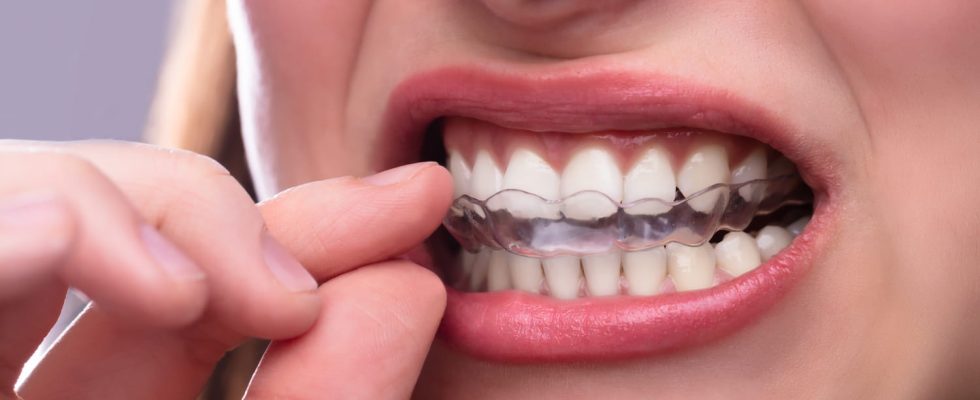Dental bruxism refers to grinding your teeth mainly at night (nocturnal bruxism). What are the typical symptoms? The causes ? What solutions (gutter, natural)?
Bruxism means grinding your teeth mainly at night and more rarely during the day. The jaws are tense and tight, which can alter tooth enamel and cause a whole host of symptoms and complications (pain in the vertebrae, blockage of the jaws, headaches, loss of teeth, etc.). People who tend to grind their teeth often do so in their sleep and may not know they have bruxism for a long time. What are typical symptoms of bruxism ? The causes ? What is the silver bullet? Anti-bruxism gutters? Natural solutions?
What is the definition of dental bruxism?
Bruxism is a disorder characterized by involuntary muscle contraction of the jaws, which causes clenching, grinding, and rubbing of the teethapart from a situation where they are normally in contact such as swallowing or chewing. It is usually temporary, but if it is prolonged, it requires therapeutic management in order to avoid certain complications. Bruxism usually occurs at night (sleep bruxism or nocturnal bruxism), but it can also be observed during the day (awake bruxism or daytime bruxism). “There are several types of bruxism and it may have repercussions on the premature wear of the teeth and on the temporomandibular joints“, says Dr. Gérard Motto, president of the French Union of Specialists in Orthodontics (SFSO) and orthodontist in Evreux.
► Bruxism known as “tightening”: it is an abnormal contraction of the jaws which is generally accentuated at night. The pressure is “vertical”.
► So-called “sharpening” bruxism: teeth grind laterally
► Bruxism called “tapping”: the person “chatters his teeth”
What are the symptoms of bruxism?
In bruxism, the person clenches or grinds their teeth, usually at night (it is called nocturnal bruxism). A person with bruxism usually experiences symptoms upon awakening:
- Pain in the teeth or jaw
- Pain that radiates to the face or temples
- Headaches
- Sensitivity in the teeth
- Sensitivity when eating/drinking hot or cold
The person sleeping with the person with bruxism (or the parents of a child) may be alerted by the noise made by the clenching or tapping of the teeth.
What are the risks and consequences of bruxism?
If bruxism has the function, during childhood, of dislodging the milk teeth, it is supposed to disappear in adulthood because it can cause complications:
- Degradation of tooth enamel. “People who practice bruxism wear down their teeth (the teeth are like “filed down”) and decrease what is called the vertical dimension of the face”, says our interlocutor.
- spinal pain,
- Jaw blockages
- Jaw pain and cracking
- Muscle fatigue in the cheeks
- Tooth loss
What is the cause of bruxism? Why do we grind our teeth?
Bruxism or teeth grinding can be caused by:
- Psychological stress or anxiety
- A misalignment of the jaws (misaligned or missing teeth)
- Sleeping on your back
- The periods of wakefulness during the light sleep phase (more important expression of the disorder)
Who to consult in case of bruxism?
THE dentist generally diagnoses bruxism according to the wear of the enamel of the teeth or following the complaint of the person or his entourage. Afterwards, care by an ENT, a stomatologist, a sleep doctor can be offered.
What is the treatment for bruxism?
Nocturnal bruxism is not always identified by the patient, which can delay his diagnosis and his management, which is based on (solution to be considered on a case-by-case basis):
► The medication prescription as muscle relaxants and anxiolytics
► The placement of a bruxism gutter called “disocclusion” to protect against dental wear which is generally worn at night. “This is a gutter acrylic which is made on dental impressions of the patient and who hasan occlusal planein other words toa small raise over the entire occlusal surface (face of the teeth which come into contact with the corresponding teeth of the other maxilla), which allows the lower jaw to be raised, free and not to be blocked on the upper teeth“explains our interlocutor.
► The placement of a partial denture in case of advanced and disabling tooth wear
► The application of varnish and fluoride gel on the teeth to reduce tooth sensitivity upon waking caused by enamel wear.
► Botulinum toxin injection at the level of the jaws or even the surgical operation depending on the case.
What are the natural solutions against bruxism?
► The practice of relaxation techniques such as hypnosis or sophrology are offered if bruxism is associated with an anxiety disorder.
► Some essential oils as wintergreen, camphor rosemary, tropical basil, mandarin or the petit grain bitter orange applied locally, in the form of a circular massage on both sides at the level of the masseter muscle, helps to relax the joint of the jaws.
► Other techniques like osteopathy or maxillofacial rehabilitation by a physiotherapist
Thanks to Dr Gérard Motto, president of the French Union of Orthodontic Specialists (SFSO) and orthodontist in Evreux.
